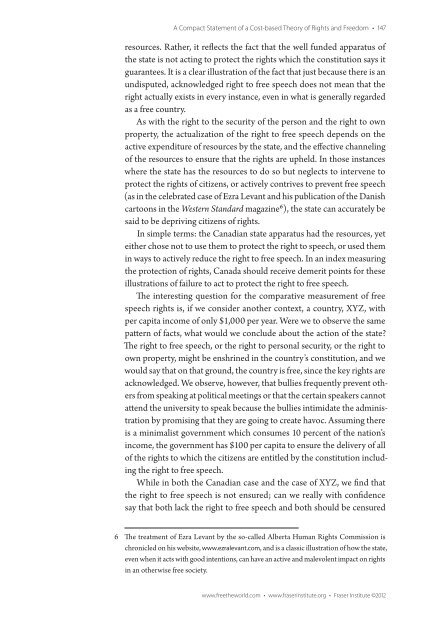Towards a Worldwide Index of Human Freedom
Towards a Worldwide Index of Human Freedom
Towards a Worldwide Index of Human Freedom
You also want an ePaper? Increase the reach of your titles
YUMPU automatically turns print PDFs into web optimized ePapers that Google loves.
A Compact Statement <strong>of</strong> a Cost-based Theory <strong>of</strong> Rights and <strong>Freedom</strong> • 147<br />
resources. Rather, it reflects the fact that the well funded apparatus <strong>of</strong><br />
the state is not acting to protect the rights which the constitution says it<br />
guarantees. It is a clear illustration <strong>of</strong> the fact that just because there is an<br />
undisputed, acknowledged right to free speech does not mean that the<br />
right actually exists in every instance, even in what is generally regarded<br />
as a free country.<br />
As with the right to the security <strong>of</strong> the person and the right to own<br />
property, the actualization <strong>of</strong> the right to free speech depends on the<br />
active expenditure <strong>of</strong> resources by the state, and the effective channeling<br />
<strong>of</strong> the resources to ensure that the rights are upheld. In those instances<br />
where the state has the resources to do so but neglects to intervene to<br />
protect the rights <strong>of</strong> citizens, or actively contrives to prevent free speech<br />
(as in the celebrated case <strong>of</strong> Ezra Levant and his publication <strong>of</strong> the Danish<br />
cartoons in the Western Standard magazine6), the state can accurately be<br />
said to be depriving citizens <strong>of</strong> rights.<br />
In simple terms: the Canadian state apparatus had the resources, yet<br />
either chose not to use them to protect the right to speech, or used them<br />
in ways to actively reduce the right to free speech. In an index measuring<br />
the protection <strong>of</strong> rights, Canada should receive demerit points for these<br />
illustrations <strong>of</strong> failure to act to protect the right to free speech.<br />
The interesting question for the comparative measurement <strong>of</strong> free<br />
speech rights is, if we consider another context, a country, XYZ, with<br />
per capita income <strong>of</strong> only $1,000 per year. Were we to observe the same<br />
pattern <strong>of</strong> facts, what would we conclude about the action <strong>of</strong> the state?<br />
The right to free speech, or the right to personal security, or the right to<br />
own property, might be enshrined in the country’s constitution, and we<br />
would say that on that ground, the country is free, since the key rights are<br />
acknowledged. We observe, however, that bullies frequently prevent others<br />
from speaking at political meetings or that the certain speakers cannot<br />
attend the university to speak because the bullies intimidate the administration<br />
by promising that they are going to create havoc. Assuming there<br />
is a minimalist government which consumes 10 percent <strong>of</strong> the nation’s<br />
income, the government has $100 per capita to ensure the delivery <strong>of</strong> all<br />
<strong>of</strong> the rights to which the citizens are entitled by the constitution including<br />
the right to free speech.<br />
While in both the Canadian case and the case <strong>of</strong> XYZ, we find that<br />
the right to free speech is not ensured; can we really with confidence<br />
say that both lack the right to free speech and both should be censured<br />
6 The treatment <strong>of</strong> Ezra Levant by the so-called Alberta <strong>Human</strong> Rights Commission is<br />
chronicled on his website, www.ezralevant.com, and is a classic illustration <strong>of</strong> how the state,<br />
even when it acts with good intentions, can have an active and malevolent impact on rights<br />
in an otherwise free society.<br />
www.freetheworld.com • www.fraserinstitute.org • Fraser Institute ©2012


